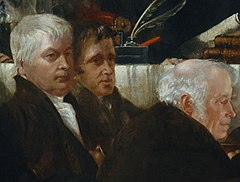Josiah Forster
| Josiah Forster | |
|---|---|

Josiah in the centre
|
|
| Born | 1782 Tottenham |
| Died | 1870 |
| Resting place | Tottenham Friends' burial ground |
| Nationality | English |
| Education | Forster's school (founded by his grandfather) |
| Occupation | Teacher and writer |
| Known for | Slavery abolitionist, Bible society |
| Spouse(s) | 1.Rachel Wilson 2.Sarah Dillworth |
| Children | one (died a baby) |
| Parent(s) | William Forster (1747–1824)and Elizabeth Hayward (1759–1837) |
| Relatives | William (brother), William Edward (nephew) |
Josiah Forster (1782 – 27 June 1870) was an English teacher and philanthropist. He was an early member of the British and Foreign Anti-Slavery Society in 1839 and a supporter of the British and Foreign Bible Society. Both he and his wife were senior figures in the British Quakers.
Forster was born in 1782. He became a teacher at the school his grandfather, also Josiah Forster (1693-1763), had founded in Tottenham. The school started in 1752 in the ballroom of their grandfather's house and was called Forster's School. His first wife, Rachel (née Wilson) was over thirty years older than he was, and died in 1801.
Forster started another school in 1805 in Southgate that eventually moved to Tottenham in 1820. He ran this school until 1826 when he decided to devote more time to his Quaker interests. His wife had already been made a minister in 1810, and shortly afterward he began sitting on Quaker committees; in 1817 he became an elder of the church. He campaigned for anti-slavery and worked for the British and Foreign Bible Society. He held the senior position of clerk to the Annual meeting of British Quakers from 1820 to 1831.
In 1838, Forster accompanied Elizabeth Fry, her husband, Lydia Irving and William Allen on Friend's business and a tour and inspection of prisons in France. They were there on other business but despite the language barrier Fry and Lydia Irving visited French prisons.
Forster sat on a committee of Quaker elders in 1836-7 who unsuccessfully tried to heal a schism in the Quaker church caused by the Beaconite Controversy. The controversy was named after a book published in January 1835 called which was written by Isaac Crewdson, a leader to the Manchester Quaker meeting. The controversy, which related to evangelism in the society, eventually led to the resignation of Crewdson and about 300 similarly minded people across the country.
The Society for the Abolition of the Slave Trade was mainly a Quaker society founded in the eighteenth century by Thomas Clarkson. Slavery had in theory been made illegal in 1807 in the British Empire. Following the Reform Act, William Wilberforce was able to get legislation through parliament. In 1838 legislation freed the slaves who had been relabelled apprentices. As a result, in August 1838 800,000 people in the British empire became free.
...
Wikipedia
